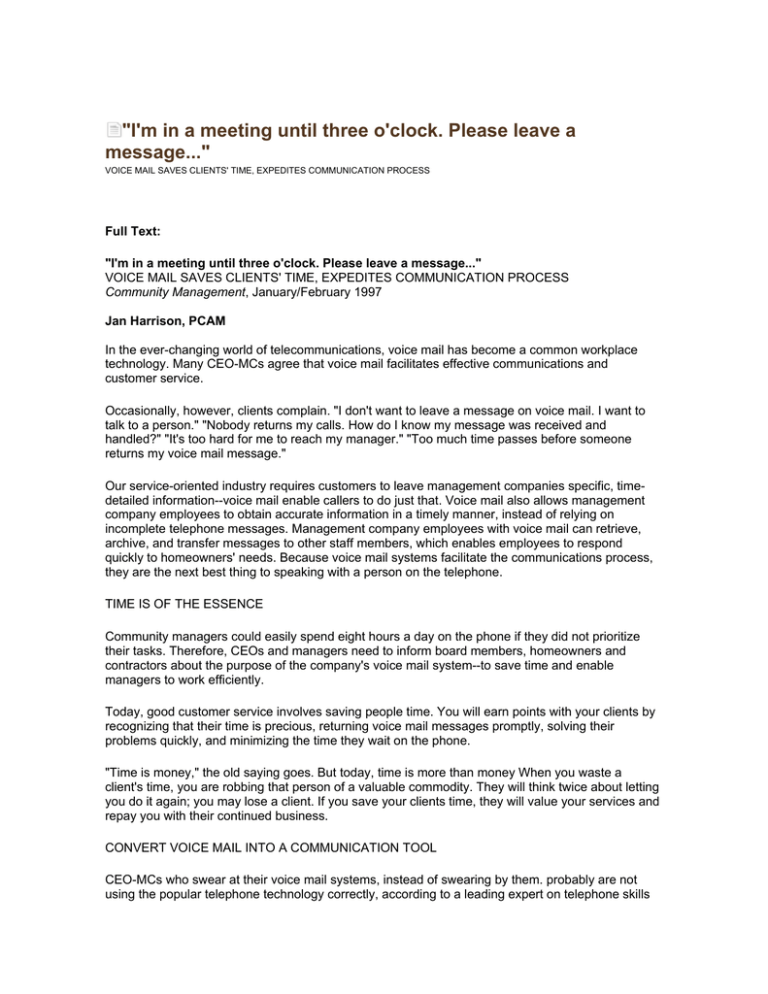
"I'm in a meeting until three o'clock. Please leave a
message..."
VOICE MAIL SAVES CLIENTS' TIME, EXPEDITES COMMUNICATION PROCESS
Full Text:
"I'm in a meeting until three o'clock. Please leave a message..."
VOICE MAIL SAVES CLIENTS' TIME, EXPEDITES COMMUNICATION PROCESS
Community Management, January/February 1997
Jan Harrison, PCAM
In the ever-changing world of telecommunications, voice mail has become a common workplace
technology. Many CEO-MCs agree that voice mail facilitates effective communications and
customer service.
Occasionally, however, clients complain. "I don't want to leave a message on voice mail. I want to
talk to a person." "Nobody returns my calls. How do I know my message was received and
handled?" "It's too hard for me to reach my manager." "Too much time passes before someone
returns my voice mail message."
Our service-oriented industry requires customers to leave management companies specific, timedetailed information--voice mail enable callers to do just that. Voice mail also allows management
company employees to obtain accurate information in a timely manner, instead of relying on
incomplete telephone messages. Management company employees with voice mail can retrieve,
archive, and transfer messages to other staff members, which enables employees to respond
quickly to homeowners' needs. Because voice mail systems facilitate the communications process,
they are the next best thing to speaking with a person on the telephone.
TIME IS OF THE ESSENCE
Community managers could easily spend eight hours a day on the phone if they did not prioritize
their tasks. Therefore, CEOs and managers need to inform board members, homeowners and
contractors about the purpose of the company's voice mail system--to save time and enable
managers to work efficiently.
Today, good customer service involves saving people time. You will earn points with your clients by
recognizing that their time is precious, returning voice mail messages promptly, solving their
problems quickly, and minimizing the time they wait on the phone.
"Time is money," the old saying goes. But today, time is more than money When you waste a
client's time, you are robbing that person of a valuable commodity. They will think twice about letting
you do it again; you may lose a client. If you save your clients time, they will value your services and
repay you with their continued business.
CONVERT VOICE MAIL INTO A COMMUNICATION TOOL
CEO-MCs who swear at their voice mail systems, instead of swearing by them. probably are not
using the popular telephone technology correctly, according to a leading expert on telephone skills
and customer service.
"Voice mail should be a cure, not a curse," said Nancy Friedman, president of Telephone "Doctor," a
training center in St. Louis. "Voice mail is not designed to replace people, it's designed to answer on
the first ring and expedite telephone calls."
One-half of all business calls require a person-to-person conversation, and there's a good chance
the caller will need to leave a message--only 30 percent of all business calls are completed on the
first try, Friedman said. By effectively using the following three parts of a voice mail system, CEOs
can eliminate callers' frustration, facilitate communications and provide stellar customer service:
Automated attendant. Many callers groan when the automated attendant begins speaking. Consider
replacing your voice mail system's digital voice with an employee's voice. Rewrite the introduction to
make it as conversational as possible. Offer callers a way to exit the voice mail system by saying,
"Press zero and an operator will be right with you." Then, continue with your information menu.
Greeting. If you think callers aren't leaving messages, perhaps your voice mail greeting lacks pizazz.
Here's an example of a great voice mail greeting: "Hi, this is Mary Jones, CEO of Community
Association Management Company. I'm in a meeting until 3:00 p.m., so please leave a message. I
check my messages daily and your call will be returned. If you need to speak to someone
immediately, please call Bob at extension 247, and he will help you. Thank you and have a great
day."
Callers are more likely to leave a message if they know you check your messages regularly. Update
your greeting periodically throughout the day to keep callers informed of your whereabouts. If you
plan to be out of the office for more than a day, let your callers know.
Message. When leaving a voice mail message, speak clearly and be thorough. Leave your name,
your company's name, reason for calling, and when and where you can be reached. Repeat your
telephone number slowly.
CEO-MCs who personalize the company's voice mail introduction, record current greetings, and
leave informative messages will discover a communication tool, and they will swear by it.
For more information, contact Nancy Friedman at (800) 882-9911 or (314) 291-1012.
Jan Harrison, PCAM, is the president of Action Property Management, Inc. in Orange, California and
serves on the editorial advisory board for CEO Insights.
� Copyright 2004, Community Associations Institute (CAI). All rights reserved.
Community Associations Institute (CAI) 225 Reinekers Lane, Suite 300, Alexandria, VA 22314 (703)
548-8600
